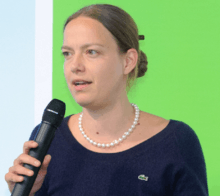Mercedes Bunz
| Mercedes Bunz | |
|---|---|
 Bunz in 2011. | |
| Born |
Mercedes Bunz November 16, 1971 Magdeburg, Saxony-Anhalt, Germany |
| Occupation | Art historian, philosopher, journalist |
| Known for | Founder of De:Bug |
Mercedes Bunz (born November 16, 1971) is a German art historian, philosopher and journalist.
Biography
Early career
Bunz studied philosophy and art history at the Freie Universität Berlin, after passing her final exams at the Celtis-Gymnasium secondary school in the German town of Schweinfurt in 1991. Together with Sascha Kösch, Riley Reinhold, and Benjamin Weiss she founded the Berlin music monthly De:Bug in 1997, becoming its co-editor and editor-in-chief from 1999 until 2001.[1]
She was awarded a scholarship by Heinrich-Böll-Stiftung, enabling her to graduate at Bauhaus-Universität Weimar[2] writing about the history of the internet between the 1950s and the 1980s. Her dissertation thesis was published as a non-fiction book in 2008. This was also used by Melih Bilgil in his 2009 animation History of the Internet.[3]
Journalism career
Having worked as a freelance journalist for a period, Bunz became a lecturer at Bielefeld University. In that same year she also began working for Berlin city magazine zitty[4] before running the on-line business of the German daily Tagesspiegel.[5] In 2009, she joined the London newspaper The Guardian as a media and technology reporter. She stayed with The Guardian until the beginning of 2011, most notably following events in on-line journalism and Social networking websites.[6][7]
In 2010 Bunz was awarded the Fachjournalisten-Preis by the German association of specialist editors, or Deutscher Fachjournalisten-Verband.[8] In 2011 she held the Impakt Fellowship of the Centre for the Humanities from the Utrecht University. She has written for the German internet magazines Telepolis[9] and Carta.[2]
Her book on the impact of algorithms on society was published by Suhrkamp in 2012.[10] An updated version of The Silent Revolution: How Digitalization Transforms Knowledge, Work, Journalism and Politics without Making Too Much Noise was published by Palgrave Macmillan in 2014.[11]
Writings
- Mercedes Bunz and Graham Meikle: The Internet of Things. Polity Press, London 2018, ISBN 978-1509517466.
- Mercedes Bunz: The Silent Revolution: How Digitalization Transforms Knowledge, Work, Journalism and Politics without Making Too Much Noise. Palgrave Macmillan, London 2014, ISBN 978-1-137-37350-2.
- Mercedes Bunz: Die stille Revolution – Wie Algorithmen Wissen, Arbeit, Öffentlichkeit und Politik verändern, ohne dabei viel Lärm zu machen. Suhrkamp Verlag, edition unseld 43, Berlin 2012, ISBN 978-3518260432.
- Mercedes Bunz: Logik der Technik. Das Denken und die Digitalisierung].
- Mercedes Bunz: Vom Speicher zum Verteiler – Die Geschichte des Internet. Kulturverlag Kadmos, Berlin 2008, ISBN 978-3-86599-025-9.
References
- ↑ Weichert, Stephan; Zabel, Christian (2010). "Mercedes Bunz – Das Tornado-Mädchen" (in German). Retrieved 11 June 2011.
- 1 2 "Profil von Mercedes Bunz" (in German). Carta. Retrieved 11 June 2011.
- ↑ Bilgil, Melih (2009). "History of the Internet". Retrieved 2 January 2012.
- ↑ Reimann, Anna (30 August 2006). "Zitty‘-Chefredakteurin Bunz Die Ausgepennte" (in German). Spiegel Online. Retrieved 11 June 2011.
- ↑ Kösch, Sascha (15 February 2007). "Mercedes geht zu Tagesspiegel-Online. Von einem Chefredakteursposten zum nächsten" (in German). De:Bug. Retrieved 11 June 2011.
- ↑ "Mercedes Bunz Profile". The Guardian. Retrieved 11 June 2011.
- ↑ Voß, Jochen (7 August 2009). "Private Gründe Chefredakteurin Bunz verlässt". tagesspiegel.de (in German). DWDL.de. Retrieved 11 June 2011.
- ↑ "Deutscher Fachjournalisten-Kongress in Berlin: Dr. Mercedes Bunz erhält Fachjournalisten-Preis 2010". Deutscher Fachjournalisten-Verband. 4 November 2010. Retrieved 11 June 2011.
- ↑ "Artikel von Mercedes Bunz". Telepolis. Retrieved 11 June 2011.
- ↑ Bunz, Mercedes. "Digitale Wahrheiten". Suhrkamp Verlag. Retrieved 2 January 2012.
- ↑ "The Silent Revolution: How Digitalization Transforms Knowledge, Work, Journalism and Politics without Making Too Much Noise". Palgrave Macmillan. Retrieved 25 February 2016.
External links
- Literature by and about Mercedes Bunz in the German National Library catalogue
- Official blog